 The U.S. Food and Drug Administration (FDA) is about to issue a new rule forcing movie theaters to disclose nutritional information for the prepared snacks they serve, including hot dogs, pretzels and popcorn, but the National Association of Theatre Owners is lobbying FDA and congressional staffers to exempt theaters from the requirement. Theaters argue the rule is an unwarranted intrusion into their business, since people come to movie theaters to see movies, not to eat food. "It's dinner and a movie, not dinner at a movie," says Gary Klein, general counsel for the theater owners' group. The stakes are high for theaters. Sales of popcorn, sodas and snacks generate up to one third of their revenue. David Ownby, the chief financial officer of Regal Entertainment Group, the country's largest theater chain, recently disclosed at an investor presentation that a bucket of popcorn costs theaters just 15 or 20 cents to make, and sells for about six dollars. The Center for Science in the Public Interest found a large dry popcorn purchased at Regal had 1,200 calories and 60 grams of saturated fat. Adding butter adds 260 more calories. The major theater chains already report nutritional information in California, where state law currently requires it, but theater owners are protesting being forced to disclose the information elsewhere, saying it should be voluntary, that people don't go to the movies that often and when they do go, they really don't care about the nutritional content of their snacks anyway.
The U.S. Food and Drug Administration (FDA) is about to issue a new rule forcing movie theaters to disclose nutritional information for the prepared snacks they serve, including hot dogs, pretzels and popcorn, but the National Association of Theatre Owners is lobbying FDA and congressional staffers to exempt theaters from the requirement. Theaters argue the rule is an unwarranted intrusion into their business, since people come to movie theaters to see movies, not to eat food. "It's dinner and a movie, not dinner at a movie," says Gary Klein, general counsel for the theater owners' group. The stakes are high for theaters. Sales of popcorn, sodas and snacks generate up to one third of their revenue. David Ownby, the chief financial officer of Regal Entertainment Group, the country's largest theater chain, recently disclosed at an investor presentation that a bucket of popcorn costs theaters just 15 or 20 cents to make, and sells for about six dollars. The Center for Science in the Public Interest found a large dry popcorn purchased at Regal had 1,200 calories and 60 grams of saturated fat. Adding butter adds 260 more calories. The major theater chains already report nutritional information in California, where state law currently requires it, but theater owners are protesting being forced to disclose the information elsewhere, saying it should be voluntary, that people don't go to the movies that often and when they do go, they really don't care about the nutritional content of their snacks anyway.

 Newly-elected Republican governors, like Bill Haslam in Tennessee, are also pushing malpractice reform at the state level. They contend that such reform — favored by businesses and medical associations — would not only bring down the costs of health insurance premiums, it would also bring doctors flocking to their states to practice. Former House Speaker
Newly-elected Republican governors, like Bill Haslam in Tennessee, are also pushing malpractice reform at the state level. They contend that such reform — favored by businesses and medical associations — would not only bring down the costs of health insurance premiums, it would also bring doctors flocking to their states to practice. Former House Speaker  Since you likely don't pay as much attention to the behavior of insurance companies as I do, you probably are not aware that
Since you likely don't pay as much attention to the behavior of insurance companies as I do, you probably are not aware that  The disaster at Japan's Fukushima Daiichi nuclear power plant hasn't stopped some U.S. legislators from insisting U.S. nuclear power plants are completely safe, but that support may be based less on facts than on financial influence. Between 1998 and 2010, the nuclear industry invested over $46 million in lobbying, about $18 million of which came from the industry's trade group, the
The disaster at Japan's Fukushima Daiichi nuclear power plant hasn't stopped some U.S. legislators from insisting U.S. nuclear power plants are completely safe, but that support may be based less on facts than on financial influence. Between 1998 and 2010, the nuclear industry invested over $46 million in lobbying, about $18 million of which came from the industry's trade group, the  The
The  William Cronon is a professor of history, geography and environmental studies at the University of Wisconsin-Madison. He is the prize winning author of many books such as Changes in the Land: Indians, Colonists, and the Ecology of New England, which revolutionized the study of environmental history. He is known as a guy with such a deep and abiding love of Wisconsin and its traditions that he leads the "get to know us" bus tour of the state offered to new faculty each year. Glaciers, rocks and history are on his agenda; politics and cheese he leaves to fellow-Wisconsinite and Capital Times editor John Nichols.
William Cronon is a professor of history, geography and environmental studies at the University of Wisconsin-Madison. He is the prize winning author of many books such as Changes in the Land: Indians, Colonists, and the Ecology of New England, which revolutionized the study of environmental history. He is known as a guy with such a deep and abiding love of Wisconsin and its traditions that he leads the "get to know us" bus tour of the state offered to new faculty each year. Glaciers, rocks and history are on his agenda; politics and cheese he leaves to fellow-Wisconsinite and Capital Times editor John Nichols.